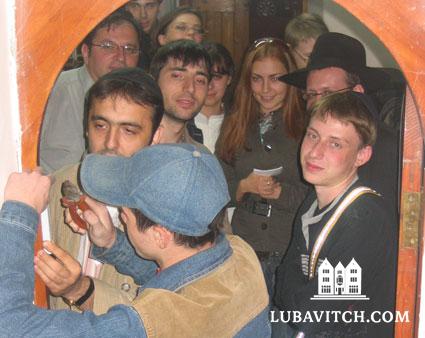Every day Rabbi Yossi Marozov passes Lenin’s birthplace, elementary school and high school on his way to his new Chabad center in Ulyanovsk. “I think to myself that my grandfather was killed by Stalin, my grandmother ran away from Russia, and here I am on the street where Lenin was born where we may soon have a public menorah. It feels victorious.”
In the town that shed its name “Simbirsk,” to honor its most famous son, Vladimir Ulyanov, better known as Vladimir Lenin, Chabad’s center occupies a humble wooden structure down the street from the home where Lenin took his first breath. Flanked by the State Congress and municipal buildings, Chabad of Ulyanovsk’s home in the Jewish center is a prime location that, with time and funding, will be leveled and rebuilt as a center for the city’s 4,000 Jews.
Marozov’s Russian roots are deep and distressing. Both sets of grandparents were trapped under Stalin’s iron fist. His grandfather Rabbi Choni Marozov served as a secretary to the fifth and sixth Lubavitcher Rebbes, Rabbi Sholom Ber Schneerson and Rabbi Yosef Yitzchok Schneerson, in Russia. In 1928, shortly after Rabbi Yosef Yitzchok Schneerson left Russia for Riga, Latvia, Rabbi Choni Marozov was arrested by the KGB. He died in their hands three days later. When Rabbi Marozov told his surviving grandparents where he would be moving, “they were a little afraid that their grandchild is moving to the country where they suffered for so long and worked to hard to leave,” he said.
But the Russian bug bit the Marozovs early. Over the course of six consecutive years, Rabbi Marozov ran summer camps for Chabad representatives throughout Russia. As his Russian language skills grew so did his appreciation of Russian Jews. “Russians are real people. You can tell them straight out that your goal is Jewish tradition, and they accept it. Many don’t want to be religious, but they respect tradition.” Suri Marozov taught high school at Beer Hagolah Institute in Brooklyn, a Jewish school for Russian émigrés.
Though Rabbi Marozov arrived with much personal Russian Jewish history, the city of Ulyanosk’s Jewish community offered scanty remnants. From 1902-1918, the public rabbinical posts were held by a military physician and a banking specialist. The city was settled by cantonists, Jewish boys forcibly drafted into 25-years of army service, but the synagogues they founded in small houses were not formally registered.
Even so, occasional bubbles of malignant anti-Semitism burble to the surface. In 2002, the editor of the provincial state newspaper Provoslavny Simbirsk published an article to expose the “human hatred, racist and anti-Russian essence of Judaism.” A year later, skinheads tried to break into the Jewish center, which is in the same building now run by Chabad.
A month into his rabbinate, Rabbi Marozov had a warm and friendly meeting with Ulyanovsk’s Governor Sergei Marozov, no relation, who he hopes, will address the problems of anti-semtism. With intermarriage hovering above the 80% mark, he’s focusing on the fate of the city’s Jews, working to reach the young people who still identify themselves as Jews but don’t know much else about it is a priority.
In the two short months since their arrival, Rabbi Marozov and his wife, Suri, both 25, (and baby Shloime) have established weekday prayer services and classes for university students. They hosted High Holiday services that attracted 40 people. As the chief rabbi of Ulyanovsk, Rabbi Marozov assumed responsibility for finding kosher sources for the Jewish Distribution Committee’s (JDC) monthly distribution of three hundred food packages, which will take clever shipping strategies because the closest kosher butcher is three hours away in Samara. By September, the Marozovs plan to have a kindergarten and Sunday school in full swing.

Be the first to write a comment.